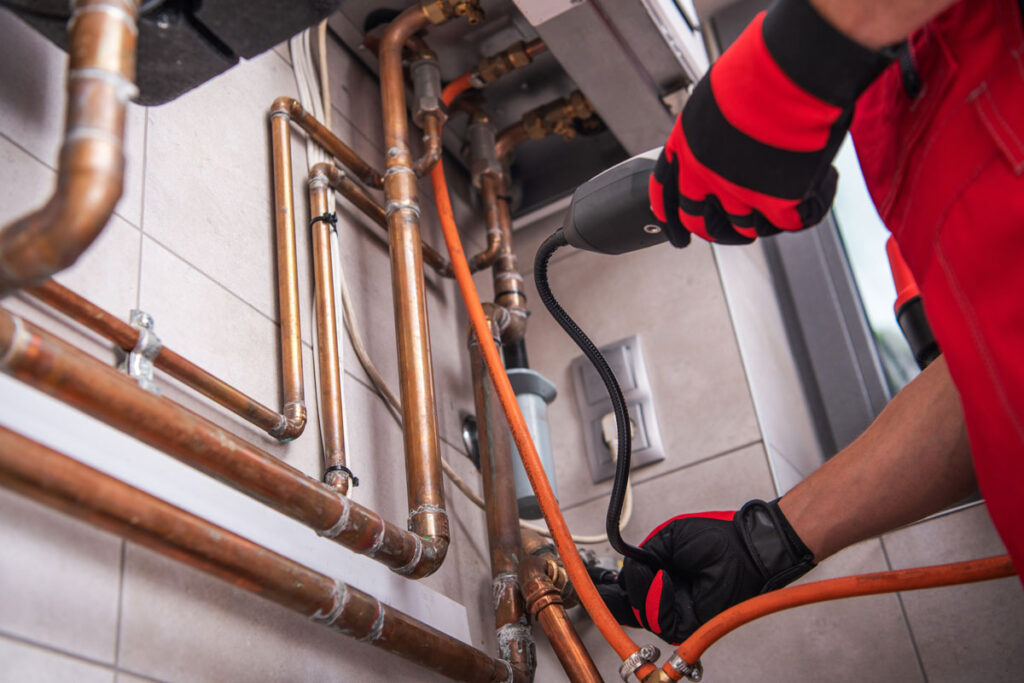While water and gas leak detection are not new, most of today’s solutions are for single apartments or houses. Until now, no whole building solutions have been available. ProSentry offers a real-time, whole-building leak detection service designed for residential apartment buildings, townhouses, and commercial buildings. John Rusk, Founder of ProSentry, says, “if a water line breaks in the kitchen and the owner is unaware, the cleanup moves rapidly past a couple of towels and a mop to needing restorative construction on the home.”
That’s exactly what happened to Rusk with his home in upstate New York. He returned home to discover his kitchen ceiling had collapsed due to a four-day flood after a pipe freeze. During reconstruction, he was offered an automatic valve by his insurer and Rusk looked into the world of wireless water sensors and artificial intelligence. He applied his 35 years of experience from the construction industry in multi-tenant buildings and created ProSentry. ProSentry offers a real-time, whole-building monitoring platform offering water and gas leak detection, elevator, boiler and vent operation monitoring and rodent traps. Next up is a vape sensor.
The service is designed for residential apartment buildings, commercial buildings, healthcare, and public housing. According to Insurance Business America, insurance payouts for water damage in 2017 was 13 billion dollars and ProSentry is aiming to drive that number down.
A Need for Better IoT Solutions for Commercial and Residential Buildings
With 8.8 million people spread over 300 square miles, New York City is the most densely populated city in the U.S. Many of New York’s apartments and commercial buildings were built in the 1920’s and 1930’s. In these facilities, undetected water leaks can travel through multiple units before being noticed. A single event can cause thousands of dollars of loss and months of displacement. The average monetary loss for a burst pipe ranges from $5,000 to over $70,000.
Gas leaks are another safety hazard for residents, but they also pose a threat to emergency personnel who arrive to fix the gas leak. Often, emergency responders arriving at a building don’t know where the leak is or its severity. They must decide whether to search the building hoping to find the source of the leak and stopping it before it reaches an explosive concentration; or turn off the building’s gas main and begin an often months long process for the building’s residents to get the gas turned back on.
Based on his personal experience, it was apparent to Rusk that the current technology and fail safes were not sufficient to protect multi-dwelling residents or business owners from the potential financial and personal risks caused by gas and water leaks.
Pairing Technology with Innovative Monitoring Services
With the formation of ProSentry, Rusk and his team quickly realized that in order to scale and provide their unique service to customers throughout New York City, they would need a reliable, forward-thinking monitoring partner that could work synergistically with their sensors – one with technology and operators in place to handle their urgent signals with speed, accuracy, and sensitivity. It was also critical that their monitoring provider could handle more specialized training, scripts, and action plans for their unique IoT gas and water sensor solutions.
In their search for a central station monitoring partner, ProSentry realized that many monitoring providers were comfortable with security and fire alarm monitoring, but not equipped for specialized IoT device monitoring.
“We needed a monitoring partner who is best in class and could connect to our API. We needed a monitoring partner that was technically savvy. AvantGuard (AG) was the only central station that had the technology in place to handle what we were trying to accomplish,” said Rusk.
The team at ProSentry understood that receiving calls about a potential water or gas leak could be stressful to customers. They looked for a central station that could handle those calls with a sense of urgency and delicacy. Rusk was impressed with the extensive training AvantGuard operators are required to undergo, the unique action plans and scripts that the operations team creates for each business partner, the professional and caring disposition of operators, and their industry-leading average signal response time of 9.4 seconds. The faster an incident is detected, reported, and acted upon directly impacts the extent and cost of the damage, so response time is critical.
Working Together to Create Safer Cities
ProSentry and AvantGuard are combining their strengths to create safer cities, save precious resources, and significantly reduce costs associated with gas or water leaks through immediate action. ProSentry installs powered sensors that detect leaks under sinks, toilets, water heaters, piping, and even has sensors to detect when exhaust fans and elevators fail. Their technology not only detects when there is an error or failure with equipment, but also exactly where it is occurring.
AvantGuard’s professional monitoring services utilize the most advanced monitoring technology available with three state-of-the-art, hot-redundant monitoring centers and skilled, caring operators. AG’s open API focus on integrating new and innovative technologies specific to each business partner, which allowed a seamless integration with ProSentry’s advanced sensors and IoT solution.
Together, ProSentry and AvantGuard are leading the future of water and gas leak detection and monitoring. Partnering with AvantGuard provides ProSentry with the monitoring element they were missing to bridge their innovative safety technology with best-in-class monitoring services. With AvantGuard as their premier monitoring provider, ProSentry is now providing their technology and safety platform in multi-tenant residential, business facilities, and hospitals in New York City, with plans to expand their business throughout the Northeast and beyond.
Link to original article here.

